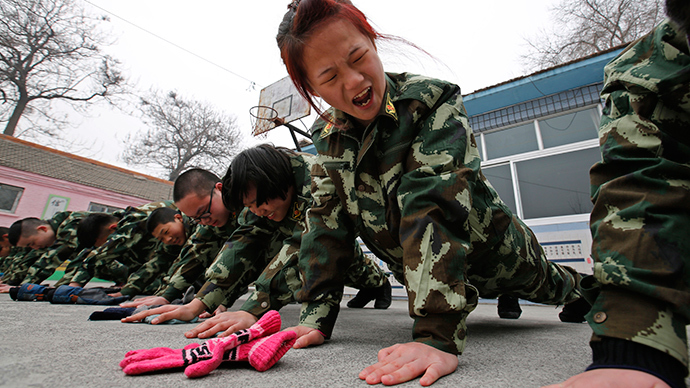Real-life 'Call of Duty' camps recruit Chinese internet-addicted teens (PHOTOS)

Military style boot-camps are flourishing in China in order to break teenagers of their internet addiction. Some 250 camps are now functioning in the country alone – and the idea may spread.
“My parents wanted me to study at home all day, and I was not
allowed to play outside,” one teenager, who gave only his
surname, Wang, told Reuters. He said that resultantly he turned
to the Internet to escape the competitive societal pressures.
“As I became addicted to the game, my school grades tumbled.
But I gained another feeling of achievement by advancing to the
next level in the game,” Wang said.
He admitted to once playing for more than three days in a row
during which he slept for only one hour.
His problems resulted in his eventual admission to the Qide
Education Center in Beijing.

Some 70 percent of the 110 children at the institution are being
treated for problems instigated by Internet overuse.
Overwhelmingly, internet overuse involves immersion in online
games.
An official at the center told Reuters that the children
typically arrive in a poor physical state. “Their obsession
with the Internet has harmed their health and they end up losing
their ability to participate in a normal life,” said Xing
Liming.
“Education and living in a military environment makes them
more disciplined and restores their ability to live a normal
life,” Xing added. Classes also involve things such as music
study.
The growing trend was highlighted in two films which were
screened at the Sundance Film Festival earlier this year.
Films included “Web Junkies” by filmmakers Shosh Shlam
and Hilla Medalia, which investigated what happened in four
months in Beijing’s Daxing Camp. Parents paid some 10,000 yaun
($1,600) for their kids to stay there – twice the average Beijing
monthly salary.

The country was the first to deem internet addiction a clinical
disorder.
However, in In August 2013, Japan also declared that it would
likely introduce “internet fasting camps” to deal with
its internet-addicted children. Akifumi Sekine, an Education
Ministry spokesperson, told the Daily Telegraph that he estimated
the problem affected “around 518,000 children at middle and
high schools across Japan.”
There has been some criticism of the camps; an
illegally-administrated facility in rural Nanning, south China,
was accused of beating to death 15-year-old Deng Sanshan, who was
being treated for video game and Internet addiction. He died less
than 24 hours after arriving at the camp.
Qihang Salvation has since been shut down, the New York Post
reported in January.















